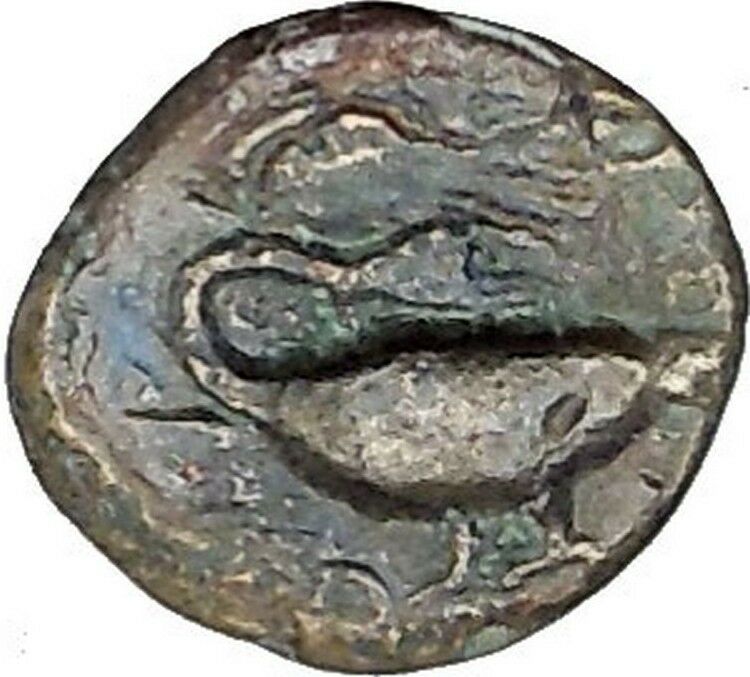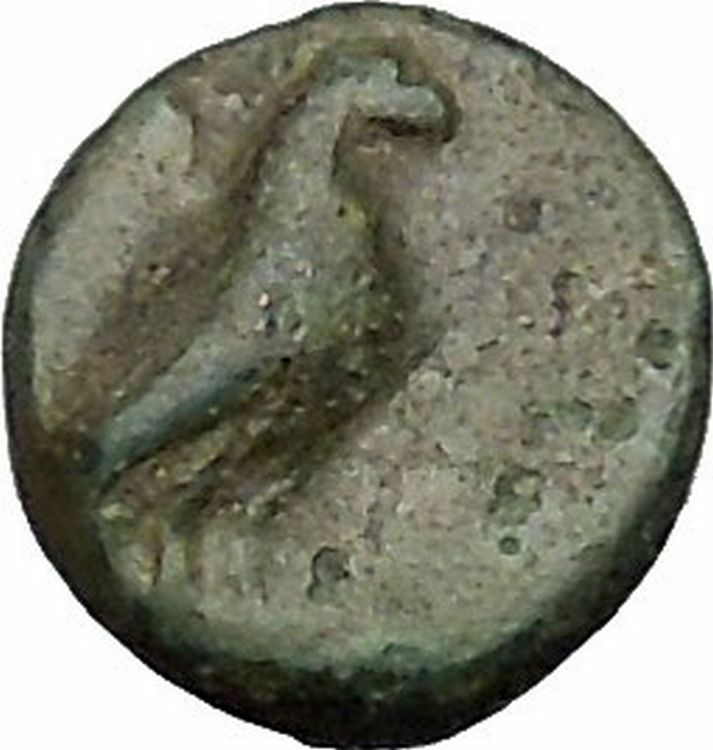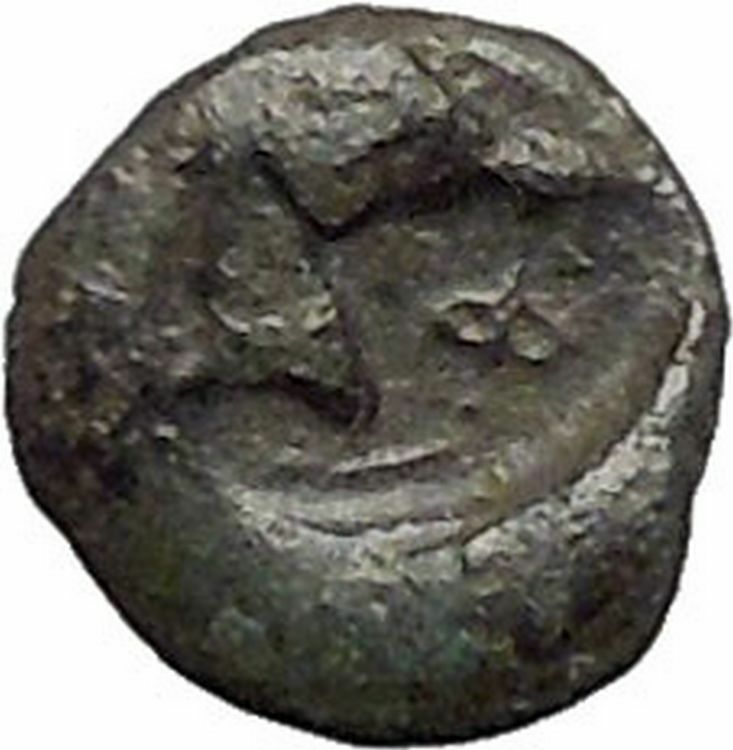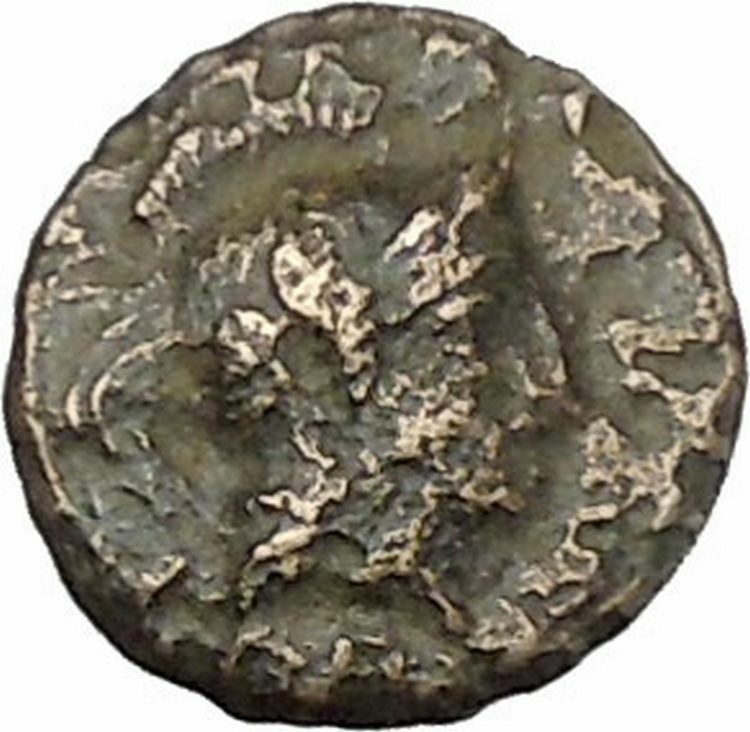|
Greek Coin of Seleukid Kingdom
Alexander I Balas – King: 152-145 B.C.
Serrate Bronze 14mm (4.26 grams) Antioch on the Orontes mint
Reference: HGC 9, 920 (Rare R2); SC 1794
Diademed head of Alexander I to right.
BAΣIΛEΩΣ – AΛEΞANΔPOΥ Owl standing right, head facing; in exergue.
Claiming to be a son of Antiochus IV, Alexander Balas swept to power in Syria in 150 B.C. with the support of Attalos of Pergamon and Ptolemy of Egypt. However, his dissolute life-style soon made him unpopular, and he was overthrown after a reign of only five years.
You are bidding on the exact item pictured, provided with a Certificate of Authenticity and Lifetime Guarantee of Authenticity.
Alexander Balas, ruler of the Greek Seleucid kingdom 150-146 BC, was a native of Smyrna of humble origin, but gave himself out to be the son of Antiochus IV Epiphanes and heir to the Seleucid throne. Along with his sister Laodice, the youngster Alexander was “discovered” by Heracleides, a former minister of Antiochus IV and brother of Timarchus, an usurper in Media who had been executed by the reigning king Demetrius I Soter.
Alexander’s claims were recognized by the Roman Senate, Ptolemy Philometor of Egypt and others. He married Cleopatra Thea, a daughter of the Ptolemaic dynasty. At first unsuccessful, Alexander finally defeated Demetrius Soter in 150 BC. Being now master of the empire, he is said to have abandoned himself to a life of debauchery. Whatever the truth behind this, the young king was forced to depend heavily on his Ptolemaic support and even struck portraits with the characteristic features of king Ptolemy I.
Demetrius Soter’s son Demetrius II profited by the opportunity to regain the throne. Ptolemy Philometor, who was Alexander’s father-in-law, went over to his side, and Alexander was defeated in the battle of Antioch (145 BC) in Syria, sometimes known as the battle of the Oenoparus.
He fled for refuge to a Nabataean prince, who murdered him and sent his head to Ptolemy Philometor, who had been mortally wounded in the engagement.
 The Seleucid Empire was a Hellenistic state ruled by the Seleucid dynasty founded by Seleucus I Nicator following the division of the empire created by Alexander the Great. Seleucus received Babylonia and, from there, expanded his dominions to include much of Alexander’s near eastern territories. The Seleucid Empire was a Hellenistic state ruled by the Seleucid dynasty founded by Seleucus I Nicator following the division of the empire created by Alexander the Great. Seleucus received Babylonia and, from there, expanded his dominions to include much of Alexander’s near eastern territories.
The Seleucid Empire was a major center of Hellenistic culture that maintained the preeminence of Greek customs where a Greek-Macedonian political elite dominated, mostly in the urban areas. The Greek population of the cities who formed the dominant elite were reinforced by emigration from Greece. Seleucid expansion into Anatolia and Greece was abruptly halted after decisive defeats at the hands of the Roman army. Their attempts to defeat their old enemy Ptolemaic Egypt were frustrated by Roman demands. Much of the eastern part of the empire was conquered by the Parthians under Mithridates I of Parthia in the mid-2nd century BC, yet the Seleucid kings continued to rule a rump state from the Seleukid Kingdom until the invasion by Armenian king Tigranes the Great and their ultimate overthrow by the Roman general Pompey.
|





 The Seleucid Empire was a Hellenistic state ruled by the Seleucid dynasty founded by Seleucus I Nicator following the division of the empire created by Alexander the Great. Seleucus received Babylonia and, from there, expanded his dominions to include much of Alexander’s near eastern territories.
The Seleucid Empire was a Hellenistic state ruled by the Seleucid dynasty founded by Seleucus I Nicator following the division of the empire created by Alexander the Great. Seleucus received Babylonia and, from there, expanded his dominions to include much of Alexander’s near eastern territories.




